David Cameron's quest to find a new deal for Britain in Europe by clawing back powers from Brussels could cause the European Union to fall apart quickly and inflict immense damage on the single market, Herman Van Rompuy, the president of the European council, has warned.
Van Rompuy, the top official in the EU, also voiced strong doubts about reopening EU treaties to retool Europe after years of debt crisis, further complicating Cameron's strategy, which hinges on renegotiating the Lisbon treaty in order to secure concessions for Britain.
In his first remarks on the vexed issue of Britain's future in the EU, Van Rompuy told the Guardian that a British exit would cause immense damage to Europe, hurting both Britain and the 26 other countries.
"If every member state were able to cherry-pick those parts of existing policies that they most like, and opt out of those that they least like, the union in general, and the single market in particular, would soon unravel," he said.
"All member states can, and do, have particular requests and needs that are always taken into consideration as part of our deliberations. I do not expect any member state to seek to undermine the fundamentals of our co-operative system in Europe."
Adding to the growing chorus of concern across Europe about the direction Cameron is taking in Europe, Wolfgang Schäuble, the influential German finance minister, told the Guardian that Britain would be shooting itself in the foot if a Cameron government second term resulted in the UK terminating more than 40 years of European membership.
"Without the EU as an amplifier, Britain's influence in the world would be lessened. No European country alone can make its voice heard in today's globalised world," said Schäuble, one of Europe's most powerful politicians. "Europe needs an ongoing critical debate about the best way forward. The British voice is sorely needed in this competition of ideas."
As the EU's first council president chairing the summits that have virtually become a monthly fixture through three years of the currency crisis, Van Rompuy has become the union's chief fixer, mediating between national leaders. The Flemish Christian Democrat expressed strong support for keeping Britain in the EU, while indirectly suggesting that Cameron's gameplan would fail. Schäuble, too, listed several reasons why Britain gained from EU membership, by implication highlighting the losses the UK would suffer were it to depart.
"The political stability and economic prosperity European integration has secured have benefited the UK as much as they have the continent. As an EU member, Britain has enjoyed unrestricted access to the world's largest single market," he said. "The EU has benefited tremendously from British membership. The UK is one of Europe's strongest, most innovative economies. London is the financial capital of Europe."
Van Rompuy, speaking to the Guardian as part of a three-day series on the future of Britain in Europe ahead of the 40th anniversary, on Tuesday, of it joining the EEC, said a British departure would "see a friend walk off into the desert". Given its history as the EU's pre-eminent trading nation, he said, Britain had far more to lose than to gain from cutting the EU cord.
"Britain's contribution is greater, I think, than it sometimes realises itself. It has been crucial in building the EU's centrepiece, the single European market, now the largest market in the world, and the common rules for the common market that are necessary for it to function.
"British expertise in the fields of foreign policy, finance and trade shape the EU's policies in these fields. It has led the way on climate change and development aid. It has offered us the English language, now in practice the lingua franca of Europe."
Senior British officials who have spent decades working in Brussels as well as in Whitehall and Downing Street are also voicing strong dismay over the direction of British travel in the EU.
Robert Cooper, a leading UK diplomat and until recently one of the EU's most senior foreign affairs officials, warned that any British attempt to disentangle itself from the EU through "repatriating" powers from Brussels would generate great rancour and recrimination. Few policymakers in the EU would be willing to do Cameron any favours, resulting in an enfeebled, lonelier Britain.
"The UK has been very good for Europe. Many would regret deeply the UK leaving," he said. "Britain would be more isolated and weaker. It would be completely crazy. The separation would not be amicable. It would be an extremely messy divorce and the bigger partners will win. The disposition for being friendly to the UK would be about zero. It's pretty much at about zero already."
The disputes about recovering national sovereignty, currently raging on the right of UK politics, are completely misplaced, he argued.
"I don't understand why the British would be more sovereign outside Europe. It wouldn't be. If you leave, you become less sovereign. Sovereignty is a seat at the table, having a voice on the future."
With Cameron poised to deliver his keynote speech on Britain in Europe within weeks, a statement being billed as the most important and fateful of his premiership, it is clear that his attempt to redefine the UK-EU relationship depends on renegotiating the Lisbon treaty, a reopening made necessary to facilitate greater integration in the eurozone in response to the flaws exposed by the currency crisis of the past three years.
Reopening the treaty, however, is a political minefield. Other EU capitals, not least Berlin, have, for the moment in any case, gone cold on the idea.
"It's a very open question as to whether this will come," said a diplomat in Brussels, adding that Cameron could find himself in the lonely position of being the sole national leader urging a renegotiation.
Van Rompuy highlighted the problems, signalling that he would seek to avoid unpicking the treaty.
"The treaties allow a considerable degree of flexibility and much can be done without needing to amend them," he said. "It is perfectly possible to write all kinds of provisions into the treaties, but amending them is a lengthy and cumbersome procedure needing the unanimous agreement of every single member government and ratification."
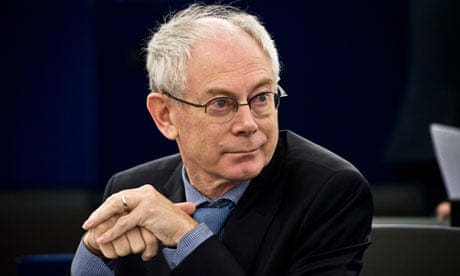
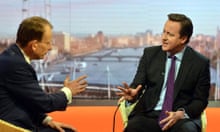
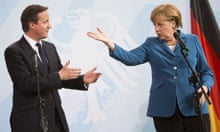



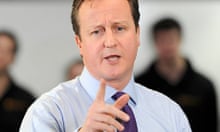

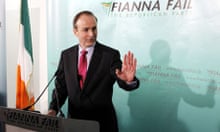

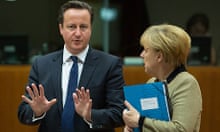
Comments (…)
Sign in or create your Guardian account to join the discussion